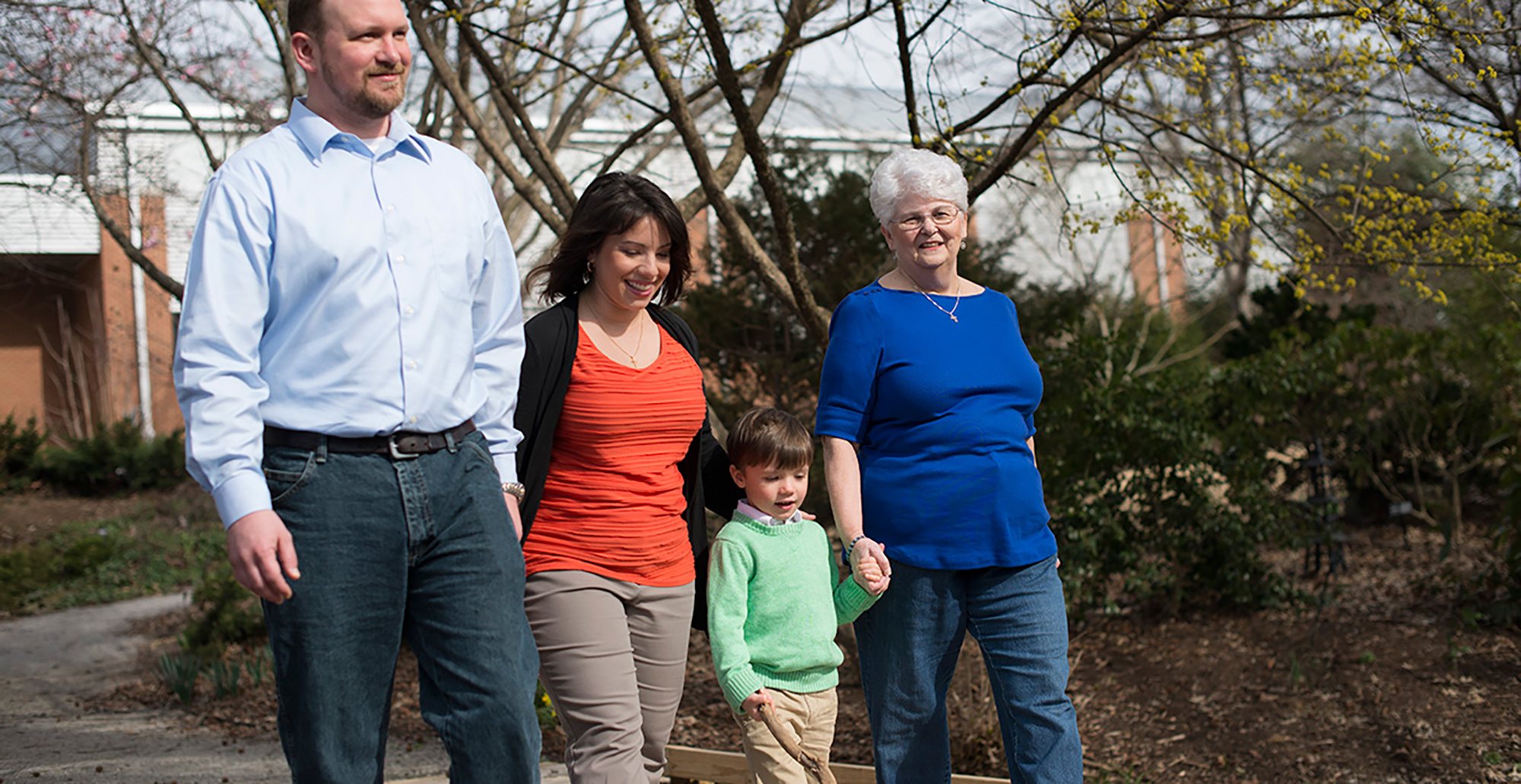Photo: Dr. Heather Wallace, assistant professor and human development specialist in the department of Family & Consumer Sciences at the University of Tennessee Institute of Agriculture, second from left, walks with her husband, Joshua, son, Jackson, and family friend, Sandie Morton, left to right, at the UT Gardens in Knoxville.
By Margot Emery
An inviting community garden on a pretty spring day—it’s the perfect place for a family outing and a great setting to slip in some physical activity.
Heather S. Wallace (Knoxville ’03, ’07, ’10) knows this well. Through her work with UT Extension Family and Consumer Sciences, Wallace wants to help Tennessee families become more aware of ready opportunities like this to add more movement and healthful foods into their lives, choices that will help curb rising obesity rates.
Wallace, a three-time graduate of UT Knoxville’s Child and Family Studies program, heads the nation’s first direct partnership between Extension and the Centers for Disease Control and Prevention. Led by UT Extension and known as Community Coalitions for Change (C3), its goal is to improve the health of residents in four rural West Tennessee counties—Haywood, Humphreys, Lake and Lauderdale. In these counties, the population’s obesity rates exceed 40 percent, placing residents at risk for diabetes, heart disease and stroke. The CDC is funding more than $3 million through 2017 to introduce healthy, community-chosen changes into the counties to address the problem.
The initiative departs from the usual approach of instructing people to make healthier choices. Instead, coalitions of local citizens, assisted by educators and resources from UT, act as agents of change. In addition, Tennessee State University, public health departments, the UT Center for Transportation Research, local school systems, and dozens of county-based businesses and agencies are contributing to the movement.
In the project’s first year, the coalitions—with UT Extension’s help—catalogued existing health resources in their communities. They identified their top needs for improvement and chose research-based solutions to drive the changes. This year, coalition members are setting in motion their vision for healthier communities through an array of activities and impacts. Among them are food demonstrations and healthy check-out lanes at grocery and corner stores, walk and bike to school days, and community health fairs. Also on the list: installing outdoor activity equipment and signage that encourages people to move more and make healthier food choices. Central to all of these efforts is UT Extension’s century-old tradition of effective, research-based education programs.
These efforts will continue in the final year of the grant, with UT also focusing on training community leaders in grant writing so they can continue and expand the momentum of healthy change in the years ahead. The impacts of C3 are being closely monitored to determine whether the model of community-driven change can fit well across the nation.
Wallace says that, while C3 focuses on helping citizens make small, doable changes in their lives, the greatest health impacts probably will occur years in the future.
“We are working to shift the culture of a community, of families, and that’s where we’re going to see things change over time rather than overnight. The small things people change today will be adopted by their children and transfer to theirs, leading to lasting intergenerational change. The goal is for obesity rates to decline over the next 10, 20, 30 years and to stay down,” Wallace says.
A big boost to her work, Wallace says, is the grounding she received in her studies at UT Knoxville.
“The Child and Family Studies program had such a holistic focus. I stayed with it for all three degrees (B.S., M.S. and Ph.D.) because I found I kept learning. It deepened my value for community-based approaches. I loved that it wove together everything from infant brain development and the importance of children’s play to understanding how environments and culture affect well-being,” she says. “For me, the CFS program painted an entire picture of understanding and helping humanity.”
Now Wallace is applying that same universal approach to improving the health of Tennesseans in the C3 project. She says the family and lifestyle perspectives she gained through her education at UT help others adopt healthy changes that they will value.
“For instance, how do you find time to go and learn a new cooking skill or about meal planning? How do you help your children try new foods or add in moments for physical activity throughout your day?” Wallace asks. “C3 is just about helping people start where they are, that’s all. Little changes that fit your lifestyle add up over time.
“Coming from a socio-ecological perspective, I see all of the moving parts when we’re talking about improving lives. We have to understand that we cannot simply tell people what to do and expect change. Instead, we must recognize and respect the influence of culture, time management and availability of resources that impact families’ making and maintaining change.”



